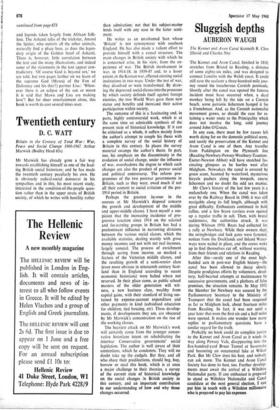Twentieth century
D. C. WATT
Mr Marwick has already gone a fair way towards establishing himself as one of the lead- ing British social historians; and he has made the twentieth century peculiarly his own. He is obviously radical-social democrat in his sympathies and in this, his most recent study, interested in the condition-of-the-people ques- tion rather than in the upper strata of British society, of which he writes with hostility rather than admiration; not that his subject-matter lends itself with any ease to the latter senti- ment.
He writes as an unashamed Scot whose `Britain' is not synonymous with southern England. He has also made a valiant effort to provide himself with a causal structure. The main changes in British society with which he is concerned arise, in his view, from the ex- perience of war. The British involvement in war, in 1914-18, in 1939-45 and, to a lesser extent, in the Korean war, affected existing social institutions in two ways. Under the test of war, they dissolved or were transformed. By draw- ing the depressed social classes into the processes by which society defends itself against foreign enemies, the two World Wars gave them new status and benefits and increased their active participation within society. The outcome of this is a fascinating and, in parts, highly controversial work, which is at the same time an admirable synthesis of the_ present state of historical knowledge. If it can be criticised as a whole, it suffers mainly from the author's attempt to couple his thesis with a complete survey of the social history of Britain in this century. In places the survey material swamps the author's thesis. In part, too, his emphasis on the discontinuity in the evolution of social change, under the influence of war, overshadows the degree to which such changes are also the product of prewar social and political controversy. The reform pro- grammes of the two postwar governments in Britain, such as they were, owed much if not all their content to social criticism of the pre- 1914 period in Britain.
Perhaps the greatest lacunae in the sources at Mr Marwick's disposal concern the growth and development of the middle and upper-middle classes. I have myself a sus- picion that the increasing incidence of pro- gressive taxation since 1914 on the salaried and fee-earning groups in Britain has had a predominant influence in narrowing divisions between the various social classes, which the available statistics, dealing mainly with gross money incomes and not with net real incomes, largely conceal. The process of enrichment through saving from income, so marked a feature of the Victorian middle classes, and the resulting growth of a semi-rentier class (even more obvious in nineteenth century Scot- land than in England according to recent economic historians) were halted where not reversed. In their place came, as public school masters of the older generation will wit- ness, a new business class, wealthy from capital gains, with their standard of living sus- tained by expense-account expenditure and other payments in kind (subsidised education for children, tied housing, etc). These develop- ments, if developments they are, are obscured by Mr Marwick's concentration on the rise of the working classes.
The heaviest attack on Mr Marwick's work will certainly come from the younger conser- vative historians intent on rehabilitating the interwar Conservative governments' social legislation. The author is well aware of their contentions, which he condemns. They will no doubt take up the cudgels. But they, and all who share their predilections, should beg, buy, borrow or steal this book, which is at once a major challenge to their theories, a survey of the current state of historical knowledge on the social changes in British society in this century, and an important contribution to our understanding of how and why those changes occurred.






































 Previous page
Previous page